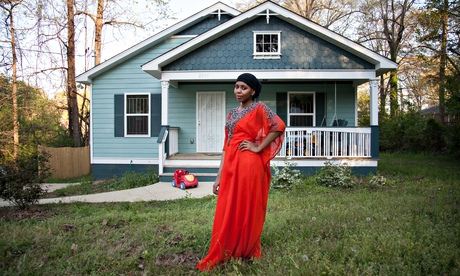
The woman who is the face of the Guardian US’s campaign to end female genital mutilation met White House officials on Thursday in the first high-level meeting aimed at bringing an end to the practice in the United States.
Jaha Dukureh, a 24-year-old mother of three from Atlanta, launched a campaign with the Guardian and the NGO Equality Now in May to highlight the issue and call for action from the government, including a study into the prevelance of FGM in the US.
Gambian-born Dukureh, who set up her own NGO, Safe Hands for Girls, to help FGM survivors like herself, told experts from across the government that FGM was not simply a brutal practice that happened in African countries but was happening on US soil and to US citizens, often during vacations back to their parents’ home countries.
“It’s been 17 years since the last study into FGM was carried out in the US and we have heard nothing from government since then – so to go from that to having such a such an important meeting that really brings all these experts together is just amazing,” she said.
Dukureh urged government officials take steps to prevent FGM - such as training health professionals and border agents as well as providing services for survivors. “This has to be just a first step,” she said. “We are not willing to just have a meeting and then head home and forget about it, this is the start of the conversation and we are going to hold the government accountable.”
Dukureh, whose petition calling for the new study on change.org has attracted more than 220,000 signatures, said the US administration had already begun to tackle the issue. At a global gathering aimed at tackling FGM and forced marriage in London in July, the Obama administration announced it would carry out a major study into female genital mutilation, in an effort to establish how many women are living with the consequences of FGM in the United States and how many girls are at risk – a vital step in tackling FGM in the US, according to campaigners.
In Washington six days later, Obama spoke publicly about FGM for the first time. “I have to say there are some traditions that just have to be gotten rid of and there’s no excuse for them. Female genital mutilation – I’m sorry, I don’t consider that a tradition worth hanging on to,” he said at a gathering of young African leaders. “I think that’s a tradition that is barbaric and should be eliminated. Violence towards women – I don’t care for that tradition. I’m not interested in it. It needs to be eliminated.”
Dukureh said she was delighted that the administration were listening to her views at the meeting, which included representatives from the White House council on women and girls, the national security council’s multilateral affairs and human rights directorate and the department of health and human services.
“When I started this campaign I didn’t think anyone would listen to me; the Guardian endorsed it when no one else seemed to care,” she said. “But now we are starting to see change and it says to me that, no matter how little a person you think you are, you can be heard. That just means everything to me.”
FGM is carried out in 29 countries, and Unicef has estimated that more than 130 million women are living with the consequences, which include heavy bleeding, infections, infertility and death during childbirth. At least 228,000 American women and girls in the US are at risk of the practice, according to previous research by the African women’s health centre of the Brigham and Women’s hospital, but the true number is thought to be much higher.
Several American survivors of FGM told the Guardian that their lives had been devastated by the procedure – which involves the partial or whole removal of a girl’s outer genitalia. Leyla, born and raised in the midwest, was just a teenager when she was taken to Somalia to meet her grandparents and extended family. She was driven to a remote village and told she was going to have her clitoris removed. “I just felt like she had ambushed me. I felt scared but I also felt like I had no choice ... I felt mad and scared but I didn’t know what to do. I felt so powerless,” she said.
Shelby Quast, of Equality Now, said the gathering could be a “tipping point” and act as a catalyst for change, so that girls in the US could finally be protected: “It’s the first time that members of the government are coming around the table to meet with civil society, survivors and members of the diaspora – this is the first step towards putting together a comprehensive action plan to tackling FGM.”
Campaigners are calling for the government to look at practical ways that FGM could be wiped out in the United States – such as engaging with paediatricians and other doctors, immigration officers and visa offices.

